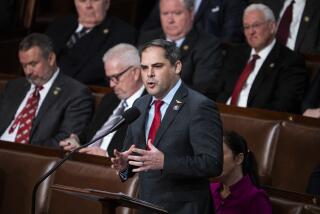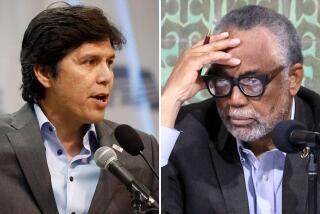Culver City Official Denies Challengerâs Claim, Defends Financial Statement : Councilman Accused of Not Reporting Moriarty Ties
Culver City council candidate Andrew Weissman has charged in a campaign letter that Councilman Ron Perkins failed to disclose his three-year business relationship with W. Patrick Moriarty in financial statements required by state law.
In a four-page letter, dated March 5 and sent to the cityâs 15,000 registered voters, Weissman said Perkins did not mention his business association with Moriarty in statements of economic interest filed with the city from 1981 through 1984.
May File Complaint
Perkins denied the charge last week and said he may file a complaint with the state Fair Political Practices Commission and may sue Weissman for libel. Perkins said he did note the relationship for all four years.
Moriarty was the central figure in a statewide political corruption investigation that resulted in his conviction in January on fraud charges. He was sentenced to seven years in prison.
Weissman, an attorney, and Perkins are running with five other candidates for two seats on the council.
Weissman and other critics, including City Councilmen Paul Jacobs and Paul Netzel, have said Perkins should not be reelected to a fourth term on April 8 because he supported Moriartyâs plan to build a housing project in the city while the two were partners in another business venture in 1982.
âHow can we ever know whose voice is speaking as (Perkins) lobbies for the projects of a business partner?â Weissmanâs letter asked.
âCulver City is entitled to the independent judgment of council members whose impartiality is untainted by the receipt of financial favors from those whose matters come before the council,â it said.
Perkins said last week that the letter, which he received in the mail, was âdirty politicsâ and contained âhalf-truths, innuendoes and out-and-out lies.â He said it was âa last desperate chance from somebody who really did not have anything to do except go with attacks instead of going to (Culver City voters) and telling them why he should be a councilman.â
Perkins has said that he became associated with Moriarty in 1980 when he met Gary Bishop, a partner in the Bishop & Moriarty General Development Co. Perkins said he was looking for financing to build his own condominium project on two lots on Duquesne Avenue. Perkins and the Bishop & Moriarty General Development Co. eventually formed a joint venture named Duquesne Villas.
Listed Involvement
(The joint venture failed last year when California Canadian Bank, the lender, foreclosed. Perkins said last week that he had filed suit against Bishop and Moriarty for misusing funds meant for the project.)
Perkins listed his involvement in the Duquesne Villas project on the statements of economic interest filed between 1981 and 1984. The Bishop & Moriarty General Development Co. was mentioned by name only in 1982 as a source of income or a loan.
The state has required elected officials to submit the forms each year since 1975 to guard against conflicts of interest.
In 1982, the Bishop & Moriarty General Development Co. was seeking a zone change that would have allowed it to build moderate-income housing on Culver Boulevard between Elenda Avenue and Sepulveda Boulevard.
According to City Council minutes of Nov. 8, 1982, Perkins cast a vote that, in essence, supported the zone change. He said in February that his support for the zoning proposal was not unethical because he did not have a financial interest in the project proposed on that site.
He said last week, however, that he would have abstained had Moriartyâs company submitted a building proposal to the council.
âI donât think there was any conflict whatsoever. We were looking at a concept,â said Perkins, a former police chief who is security head for McDonnell Douglas Helicopter Co. in Culver City. âI thought it was good for the council to see what could go on that strip of land.â
Weissman said in an interview Thursday that he decided to write his letter charging Perkins with failing to report his ties to Moriarty when Weissman could find no direct reference to Moriartyâs company in Perkinsâ financial statements.
He said that Perkins, as a Redevelopment Agency member and councilman in 1982, should have publicly announced his relationship with the Bishop & Moriarty General Development Co. when the firm requested the zoning change.
Disclosure Necessary
âThe responsibility that the elected official has is to disclose conflicts of interest. If itâs not reflected on the statements of conflict of interest, then the individual has to be sensitive enough to mention the potential conflict,â Weissman said.
âThe intent of the letter was to educate the voter. There are a vast number of people in Culver City who do not read the newspaper,â said Weissman, a former Chamber of Commerce president. The letter, he said, will âallow the voter to make informed decisions on the candidates.â
Weissman said the tone of the letter was âvery criticalâ of Perkins but was appropriate because it will encourage debate in Culver City.
Councilmen Richard Brundo and Jacobs and Netzel, each with two years left to serve, have endorsed Weissman. Incumbent Richard Alexander, also a candidate, has not endorsed another candidate.
The other candidates for the two council seats are Fred Ellis, a retired contractor; Richard Nielsen, a deputy attorney general; Jozelle Smith, a newspaper columnist, and Lisa Tracy, a security supervisor.
More to Read
Sign up for Essential California
The most important California stories and recommendations in your inbox every morning.
You may occasionally receive promotional content from the Los Angeles Times.










